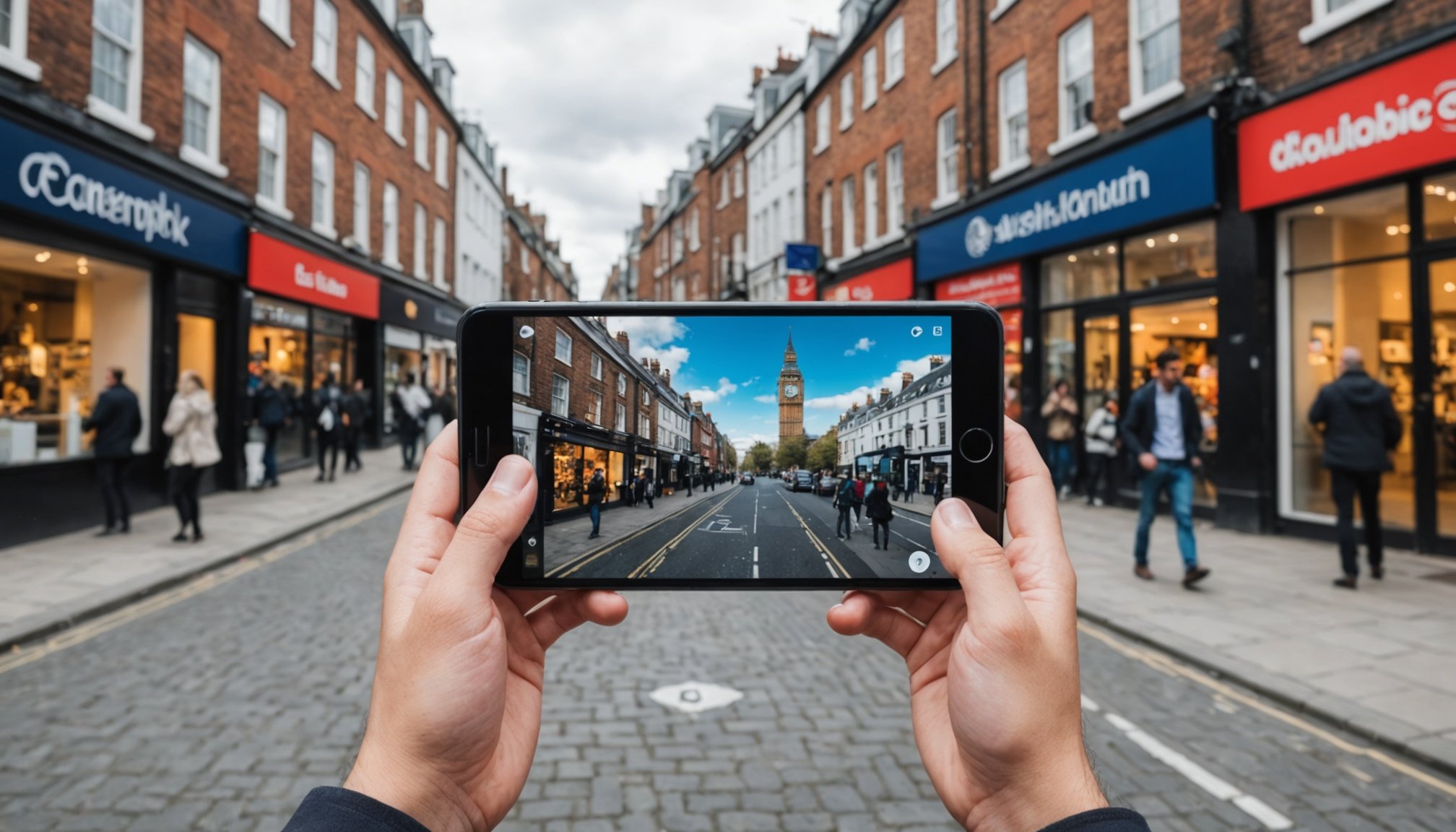The Role of Augmented Reality in Modern UK Marketing
Augmented Reality (AR) is revolutionizing marketing strategies across the UK, leveraging this innovative technology to create engaging campaigns that captivate consumers. AR blends virtual elements with real-world environments, offering unique experiences that are reshaping how brands interact with their audience.
Brands embracing Augmented Reality Marketing enhance their visibility and consumer engagement through memorable, interactive campaigns. By integrating AR, companies can elevate their UK campaign strategies, crafting personalised user experiences directly on a customer’s smartphone or tablet. This not only drives engagement but also increases the likelihood of converting interactions into sales.
In parallel : Crucial Elements for a Robust Cybersecurity Plan in the UK Healthcare Sector
Several UK companies have successfully woven AR into their marketing tapestries. For instance, brands such as Burberry have utilised customer engagement techniques through AR-enhanced experiences, allowing consumers to visualise products in their own environments before making a purchase. This not only showcases the product but also significantly boosts brand perception and affinity.
In the fiercely competitive UK market, the use of AR technology is transformative. It enables companies to stand out by creating memorable and innovative marketing experiences that resonate deeply with their target audience, ultimately enhancing brand loyalty and increasing market share.
Also to discover : Transforming Retail Supply Chains in the UK: Harnessing Big Data for Unprecedented Transparency and Efficiency
Proven AR Techniques for Customer Engagement
Augmented Reality (AR) propels interactive marketing by transforming typical customer interactions into vibrant experiences. As brands in the UK focus on consumer experience enhancement, several AR techniques are making waves.
Immersive Product Experiences
AR enables immersive product experiences by allowing consumers to visualise items in their own environment. This approach not only boosts confidence in purchasing decisions but also fosters a deeper connection with the product.
Interactive Storytelling
Storytelling is powerful in AR marketing. By embedding a narrative within the AR experience, brands create memorable engagements. Interactive storytelling can convey brand messaging subliminally, increasing retention and recall.
Gamification in Marketing
Incorporating gamification strategies into AR campaigns is a compelling way to capture consumer interest. By infusing fun and competition, these techniques enhance brand interaction and encourage active participation. Simple games or reward systems integrated with AR can significantly amplify user interest, stretching engagement durations.
Utilising these AR techniques, UK brands continue to innovate their marketing strategies, establishing new industry benchmarks. By blending immersive technology with creativity, companies are redefining consumer experiences, setting high standards for customer engagement techniques and leaving lasting impressions.
Case Studies of Successful AR Campaigns in the UK
In the ever-evolving landscape of UK marketing, several companies have crafted exemplary Augmented Reality (AR) campaigns that have left indelible impressions. These AR Case Studies unfold the journey of innovation blended with strategic acumen.
One noteworthy example is the AR initiative by the luxury brand Burberry. By leveraging AR technology, Burberry produced an immersive experience that allowed consumers to visualize products in their own spaces. This not only increased consumer confidence but also elevated the brand’s market perception.
Similar success can be observed with ASOS, an online fashion retailer. ASOS utilized AR to showcase clothes on virtual models, providing a real-time outfit experience. This campaign strengthened user engagement and elevated customer satisfaction, aligning well with UK Marketing Success stories.
These Campaign Examples provide valuable insights into the key elements contributing to success, such as user-centered design and seamless integration of technology. They highlight the importance of understanding consumer needs and preferences in implementing AR effectively. In adopting such techniques, brands have set new benchmarks for AR Marketing in the UK, ensuring their campaigns are not only innovative but also impactful. The lessons learned emphasize the significance of a strategic approach combined with technological fluency.
Expert Insights on Implementing AR Strategies
Understanding the nuances of AR Implementation Insights is vital for successful marketing strategies. Marketing Experts emphasize the importance of aligning AR plans with precise audience needs. Knowing your target demographic ensures the augmented reality experience resonates and engages effectively.
Importance of Audience Understanding
Tailoring AR strategies requires a deep dive into consumer habits and preferences. This informs a brand’s approach, ensuring that the augmented reality features create value and relevance. Businesses must adapt their content by considering cultural and technological variations among different audience segments.
Choosing the Right AR Tools
Selecting appropriate technologies is crucial for seamless execution. Evaluating comprehensive features and compatibility should guide decision-making. For instance, certain platforms offer more flexibility and user-friendly interfaces, which can significantly improve the deployment of AR campaigns.
Collaborating with AR Experts
To drive impactful results, engaging with seasoned AR specialists is essential. Their expertise in designing, developing, and implementing engaging AR experiences can elevate marketing strategies. Collaborations can infuse innovative solutions into the project, ensuring technological and strategic trends are effectively integrated. Involving experts aids in overcoming potential hurdles and enhances campaign precision and sophistication.
Measuring the Effectiveness of AR Campaigns
Ensuring successful AR campaigns largely depends on tracking accurate metrics. Campaign Measurement incorporates several key performance indicators (KPIs) crucial for evaluating the impact of augmented reality in marketing. These KPIs may include engagement rates, session durations, and conversion rates.
AR Metrics provide insightful data that depict user interactions with AR experiences. Brands should focus on metrics such as user retention and time spent within AR environments, as higher engagement often indicates successful audience captivation.
Performance Analytics tools offer valuable insights by quantifying consumer reaction and engagement with AR content. These tools help marketers identify what’s working, guiding adjustments for better campaign results. Utilising analytics platforms equips businesses with detailed reports on interactions and conversion statistics, serving as a foundation for refining strategies.
Analyzing consumer feedback is paramount. Feedback forms or direct user comments can offer qualitative insights to complement quantitative data. This dual approach ensures a comprehensive understanding of AR campaign performance, helping brands improve future initiatives.
By effectively measuring AR campaign outcomes, companies can tailor their marketing efforts, ensuring their strategies not only resonate with audiences but also maximise return on investment.
Challenges and Solutions in AR Marketing
Implementing AR marketing presents various obstacles, but each offers an avenue for innovation. Understanding these AR Marketing Challenges can guide businesses in crafting resilient strategies.
Technical Challenges
Technical challenges in AR deployment include software compatibility and hardware limitations. Brands must ensure their AR solutions work seamlessly across devices and platforms to maximise reach and impact.
User Adoption Issues
Encouraging widespread user adoption can be daunting. To overcome this, brands should focus on creating intuitive, user-friendly interfaces, making the AR experiences as accessible as possible. Educating consumers about the benefits and usability of AR can also foster acceptance and enthusiasm.
Budget Constraints
For many brands, budget constraints hinder AR campaign development. Cost-effective solutions include leveraging pre-existing platforms or collaborating with partners in shared ventures. Innovating within financial limitations while ensuring quality can lead to impressive results.
By addressing these challenges with innovative solutions, businesses can enhance their AR marketing strategies, ensuring they remain competitive and effective in the evolving UK marketplace. Employing strategic planning and resourcefulness can result in compelling campaigns that captivate consumers and drive engagement.
Future Trends in AR Marketing for the UK
Augmented Reality (AR) continues to evolve, promising transformative shifts in marketing trends across the UK. As technology advances, brands are eagerly exploring upcoming trends to stay ahead of the curve.
Upcoming Trends in AR Technology and Marketing
Enhanced spatial computing is set to redefine the AR landscape. This includes advances in 3D modelling and real-time interaction capabilities, propelling innovations in user engagement strategies. Brands can look forward to UK marketing campaigns becoming even more immersive and personalized.
Predictions on Consumer Behavior Shifts with AR Integration
With AR’s integration into everyday consumer experiences, we foresee a significant shift in UK consumer behaviour. Consumers are likely to expect more personalised and dynamic interactions, pushing brands to develop more tailored and interactive customer engagement techniques.
Preparing for the Evolution of AR in the Marketing Landscape
As the future of AR unfolds, businesses must equip themselves with knowledge of emerging trends. Investing in training and upgrading technical infrastructure is crucial. Additionally, fostering a culture of experimentation within teams can lead to breakthrough ideas, ensuring brands remain competitive. By embracing these future trends, UK companies can enhance their marketing strategies, meet consumer expectations, and drive brand loyalty.









